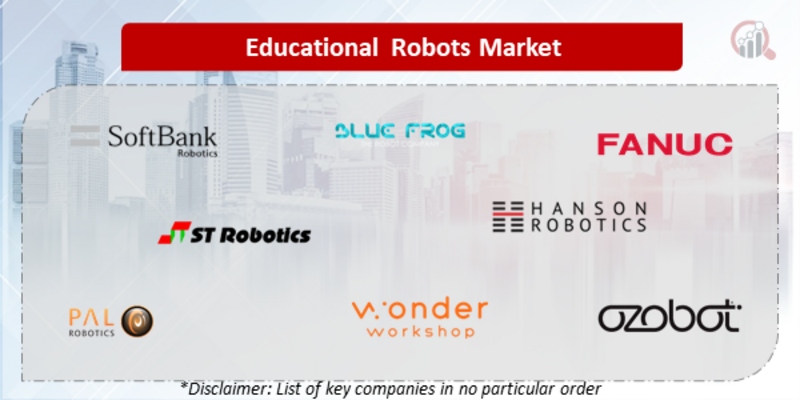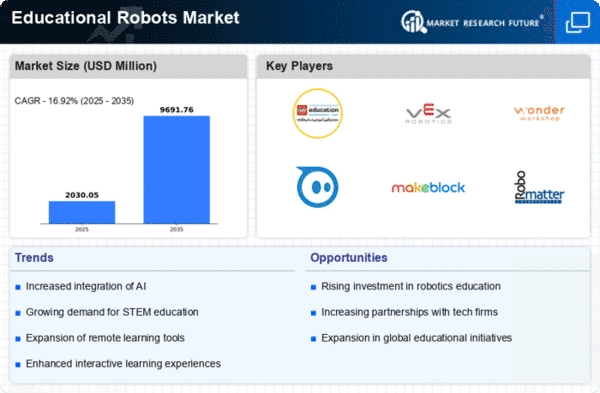Top Industry Leaders in the Educational Robots Market

The Competitive Landscape of the Educational Robots Market
The educational robots market, where silicon sparks ignite curiosity and robots dance with data. This captivating arena witnesses established tech giants and nimble innovators grappling for a bigger share of the learning playground, employing their bots to nurture young minds with STEM skills, coding literacy, and critical thinking. From playful companions fostering social-emotional learning to sophisticated machines simulating complex scientific concepts, educational robots redefine the future of education, making learning interactive, engaging, and accessible for all. Let's dissect the key strategies and players shaping this vibrant scene.
Key Player:
- SoftBank
- BLUE FROG ROBOTICS
- Aisoy Robotics
- QIHAN Technology Co.
- FANUC
- ST Robot Co.
- Hanson Robotics
- PAL Robotics
- Probotics America
- Wonder Workshop
- Ozobot & Evollve, Inc.
- Makeblock, Co. Ltd
- Modular Robotics
Strategies Adopted by Market Leaders:
- Technological Differentiation: Companies compete fiercely on technological advancements, focusing on factors like ease of programming for children of different ages, integration with diverse learning platforms and curricula, advanced sensors and functionalities for engaging interactions, and robust build quality for classroom environments. Developing robots with voice recognition, facial recognition, and augmented reality capabilities are key differentiators.
- Expanding Application Reach: Moving beyond traditional coding and STEM education to address language learning, social-emotional learning, and life skills development unlocks new market segments and drives wider adoption. Developing robots for storytelling, social interaction, and creative expression are crucial.
- Addressing Affordability and Accessibility: Making educational robots more affordable and accessible is vital for widespread adoption, particularly in schools and families with limited resources. Offering a range of price points, developing open-source platforms, and providing training resources for educators are key strategies. Promoting government funding initiatives and partnerships with educational institutions can also increase accessibility.
- Building Partnerships and Collaborations: Fostering partnerships with educational institutions, curriculum developers, robotics clubs, and non-profit organizations accelerates innovation, shares expertise, and expands market reach. Collaborating on developing educational content, integrating robots into existing curricula, and organizing robotics competitions contribute to market growth.
Factors for Market Share Analysis:
- Revenue Generated: This straightforward metric reflects a company's market penetration and financial strength.
- Number of Educational Robots Shipped: Understanding the volume of deployed robots provides insight into market reach and customer adoption.
- Technology Advancements: Assessing a company's investment in R&D, patent portfolio, and cutting-edge robotics technologies helps gauge its future competitive edge.
- Customer Satisfaction: Analyzing user feedback from educators, parents, and children reveals how effectively a company caters to diverse needs and builds brand reputation.
New and Emerging Companies:
The influx of innovative startups is adding new chapters to the educational robot story. Companies like Robo Wunderkind GmbH (Germany), Embodied Inc. (USA), and CogniToys LLC (USA) introduce novel solutions like robots with advanced AI capabilities for personalized learning and social interaction, robots that respond to emotions and promote social-emotional development, and robots designed for children with special needs. These advancements redefine the possibilities of educational robots and unlock new market segments for personalized learning, inclusive education, and social-emotional learning.
Industry Developments:
Hasbro Inc. (USA):
- January 9, 2024- Launched a new line of robots featuring characters from their popular "Transformers" franchise, integrating coding challenges and STEM activities.
Mattel Inc. (USA):
- December 5, 2023- Partnered with a leading educational technology company to develop robots aligned with STEAM curriculum standards, catering to K-12 education.
LEGO Group (Denmark):
- November 9, 2023- Unveiled a modular robotics kit with advanced sensors and programmable functions, aimed at encouraging creativity and innovation in older children.










